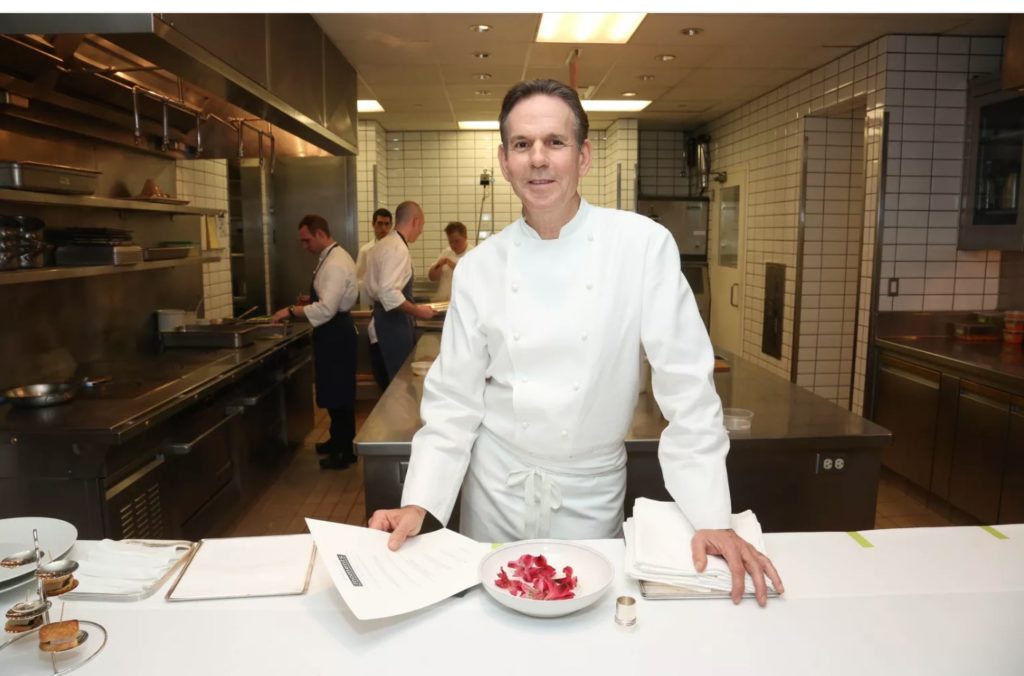
Image Source: Eater
Every week we track the business, tech and investment trends in CPG, retail, restaurants, agriculture, cooking and health, so you don’t have to. Here are some of this week’s top headlines.
The so-called Paycheck Protection Program has all but failed small, independent restaurants. The $349 billion program has run out of money just two weeks after going into effect. Four days after the SBA opened the application window, Ruth’s Chris Steak House was granted a $20 million in forgivable loans. Unsurprisingly, the White House’s Economic Council was revealed to include fast food chain executives, fine dining chefs, and not a single independent operator.
Last month, French Agricultural Minister Didier Guillaume issued his appeal for a “great agricultural army” amid the coronavirus lockdown that has seen border closures that are depriving farmers of their usual contingents of migrant seasonal laborers. More than 200,000 people answered France’s call for temporarily workers to help farmers desperate for extra hands as summer approaches.
In the US, large farmers are being forced to destroying millions of pounds of fresh goods that they can no longer sell. In response, the Trump administration announced plans to purchase milk and meat products as part of a $15.5 billion aid package that would go to US food banks or sent overseas as aid.
Coronavirus cases are continuing to grow across the meat packing and grocery industry. The world’s largest pork producer, Smithfield Foods, shut down three of its meat plants this week as its Sioux Falls, South Dakota plant became the single biggest hotspot in the United States with 518 employees testing positive for COVID-19. Deaths among workers have lent urgency to the demands for protection and underscore the fragility of interconnected food supply chains amid the coronavirus pandemic.
The COVID-19 pandemic has put more than 10 million independent restaurant workers at risk of losing their jobs for good. Across sectors, businesses are being forced to pivot their business models as consumers go on lockdown and change their buying habits. This round-up features many of the ways the pandemic is impacting all parts of the food industry.
In an effort to do our part and support the community we love so dearly, we have compiled a list of resources and organizations that are providing support to those in need. We are also offering free job postings to anyone who is looking to employ people impacted by the COVID-19 pandemic.
- Resources: We have compiled a database of resources for those in the food industry impacted by the pandemic here. Please add your own resources as well.
- Jobs: We need to band together to support everyone across the food system who has lost their job due to the pandemic. Use code “coronavirusfoodjobs” to post remote or remote-friendly food jobs on our job board for free.
We need your support as well. Producing our newsletter takes a lot of time and resources, and we need to change our business model to keep it going. To date, we’ve funded our work through our events, sponsorships and consulting, which are all on hold due to the pandemic. If you find our newsletter to be a valuable resource, we hope you will consider making a one time or monthly contribution, so we can keep the newsletter going and free for those who can not afford a subscription fee. Whether it’s $5 or $500 every bit helps and shows us that you value our work. Not able to contribute right now? You can help by sharing our newsletter with friends and colleagues.
Check out our weekly round-up of last week’s top food startup, tech and innovation news below or peruse the full newsletter here.
1. The White House’s Economic Council for Restaurants Is Just a Bunch of Chains and Four Fine Dining Chefs – Eater
The food and beverage group is made up almost entirely of executives from major restaurant chains, industry associations, food and drink manufacturers, and a few high-profile chef-restaurateurs.
2. France: More Than 200K People Sign Up to Help French Farmers with Harvest – The Local
Citizens are responding to an appeal by agriculture minister Didier Guillaume for a “great agricultural army” amid the coronavirus lockdown that has seen border closures that are depriving farmers of their usual contingents of migrant laborers.
3. Dumped Milk, Smashed Eggs, Plowed Vegetables: Food Waste of the Pandemic – New York Times
With restaurants, hotels and schools closed, many of the nation’s largest farms are destroying millions of pounds of fresh goods that they can no longer sell.
4. Ruth’s Chris Steak House Gets $20M from Coronavirus Aid Program – Wall Street Journal
The high-end dining chain is among the first public companies to disclose it has received a government-backed loan to support payroll, days after the $350b program to aid small businesses started taking applications.
5. Hundreds of US Meat Workers Have Now Tested Positive for Virus – Bloomberg
As many as 50 people at a JBS facility tested positive, adding to more than 160 cases at a Cargill meat-packaging plant and 190 cases at a Smithfield Foods pork facility. The Cargill and Smithfield plants are being shuttered, while JBS said it will continue operations.
6. World’s Top Pork Producer Closes More Plants in a Domino Effect – Bloomberg
Top pork producer Smithfield Foods is shutting down two more US plants in a decision that underscores the vulnerability of interconnected food supply chains amid the coronavirus pandemic.
7. Coronavirus Cases at DC Whole Foods Highlight Risks Facing Grocery Workers – New York Times
A cluster of infections at the store in the heart of trendy downtown Washington is not an isolated episode, as the nation’s grocery workers increasingly fall ill.
8. Federal Small Business Bailout Fund Is About to Run Dry – Eater
As chains like Potbelly’s and Ruth’s Chris secure $10m loans, smaller restaurants stand to be crowded out.
9. The Cares Act Was Supposed to Help Save Small Businesses, but Independent Restaurants Remain in Dire Straits – The Washington Post
Operators say the $2.2t relief plan is not designed to help small restaurants that have already shut down or been reduced to a carryout.
10. By the Numbers: How the Coronavirus Pandemic Continues to Devastate the Restaurant Industry – Eater
Sales of gift cards and liquor are booming, but restaurants and workers remain at the center of the economic storm. An NRA survey showed that while 44% of restaurant owners have closed temporarily, 11% are planning to shut down for good next month.
11. US to Buy Milk and Meat as Part of $15.5B Farm Aid – Bloomberg
The Trump administration would like to make purchases of milk and meat products as part of a $15.5b initial aid package to farmers rattled by the coronavirus. The products would go to US food banks or sent overseas as aid.
12. Korean Cold Chain Pioneer Kurly Raises a Reported $150M – but Says Round Remains Open – AgFunder
The funding comes from existing investors DST Global, Hillhouse Capital and Sequoia Capital. The round remains open. Kurly plans to use funding for a new fulfillment center and new customer acquisition.
13. Choco Gobbles Up $30.2M at a $250M+ Valuation, Tweaks Restaurant Supplier Ordering Platform to Sell to Consumers During Pandemic – TechCrunch
Coatue Management led the round. Funds will be used to continue building out its technology and customer base, as well as to adapt to the current market with more initiatives to help its customers stay in business.
14. Medical Meal Replacement Brand Kate Farms Raises $23M – BevNet
Funding will primarily go towards scaling company operations and increasing sales and marketing efforts. The round consisted of individual investors led by David Roux, co-founder of Silver Lake Partners.
15. SoftBank, One of 2019’s Top Agrifood Investors, Forecasts $24B Loss on Its Startup Bets – AgFunder
The announcement came just a few days after SoftBank founder and CEO Masayoshi Son admitted that he expected 15 companies in the Vision Fund portfolio to go bankrupt.
16. UAE: Amid Covid-19, the Gulf Region Commits $200M to Safeguard Its Food Security with Agtech – AgFunder
Wafra invested $10m in Pure Harvest Smart Farm’s Series A, with plans to invest up to a total of $100m to support the expansion of the company’s farms. Abu Dhabi Investment Office’s committed $100m in grant funding to further the R&D of four agtech companies.
17. Indian Cloud Kitchen Trailblazer Rebel Foods Raises $50M from Coatue – AgFunder
Rebel Foods’ other investors include Sequoia Capital and City Storage Systems. The startup is expanding to the UAE and currently operates 325 cloud kitchens in India.
Our newsletter is the absolute easiest way to stay on top of the emerging sector, so sign up for it today and never miss the latest food tech and innovation news and trends, Already signed up? Share the love with your friends and colleagues!
Related Posts
 New Bill Proposes $120B in Grants for Independent Restaurants, Dan Barber Predicts Small Farm Catastrophe + More
New Bill Proposes $120B in Grants for Independent Restaurants, Dan Barber Predicts Small Farm Catastrophe + More Sweetgreen, Shake Shack & Ruth’s Chris Return PPP Loans, More Meat Processing Plants Shuttered + More
Sweetgreen, Shake Shack & Ruth’s Chris Return PPP Loans, More Meat Processing Plants Shuttered + More Fish Industry Loses 85% of Revenue, Dairy Industry Expects to Loose $5-10B in Sales + More
Fish Industry Loses 85% of Revenue, Dairy Industry Expects to Loose $5-10B in Sales + More


